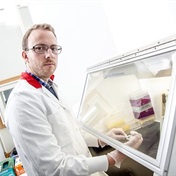For the first time in nearly two decades, Britain will significantly change how stem cell and embryology research is conducted when the Human Fertilisation and Embryology legislation enters the House of Commons sometime in the coming weeks or months.
The proposed bill would allow research that experts believe could lead to new treatments and possibly even cures for patients with degenerative diseases.
"The goal of this research is to try to create new treatments, new therapies for really quite catastrophic diseases," said Stephen Minger, director of the stem cell biology laboratory at King's College University in London. "With the appropriate resources, we could be in the clinic in about five years."
If the bill's provisions for such research were removed, Minger said, such breakthroughs might not happen, especially in Britain.
Strong opposition from church
Roman Catholic leaders have labelled the bill a "monstrous attack on human rights, human dignity and human life." Three Catholic senior members of Prime Minister Gordon Brown's Cabinet have said they would need to consider their options if he imposed voting rules on his party regarding the bill. But they did not immediately threaten to resign.
In response, Brown declared Tuesday that he would allow his party's members a free vote on the legislation's more contentious parts.
"We will respect the conscience of every member of Parliament as they decide how to cast their vote in this," Brown said. But he also said he would still expect his Labour Party members to ultimately support the bill's passage.
The bill includes measures to allow experiments such as creating human embryos from animal eggs, and cellular transplants to produce an embryo from the DNA of two women and one man.
A regulatory authority already has granted several British scientists limited licenses to create such mixed embryos, but the new bill will clearly spell out how such licenses are awarded in the future.
May lead to more treatments and cures
Producing human embryos from animal eggs involves injecting an empty cow or rabbit egg with human DNA. A burst of electricity is then used to trick the egg into dividing regularly, so that it becomes a very early embryo, from which stem cells can be extracted.
The embryos do not develop beyond 14 days. By using animal eggs rather than human eggs, which are in very short supply, scientists hope to refine their techniques for producing stem cells.
Those are then used to study diseases at the cellular level, allowing scientists to develop potential treatments and cures.
Scientists also want to be able to create embryos using the DNA from two women and one man, to cure currently untreatable genetic conditions.
In preliminary research funded by the Muscular Dystrophy Campaign, experts at Newcastle University used normal embryos created from one man and one woman that had defective mitochondria, a cell's energy source, in the woman's egg. They then transplanted that embryo into an emptied egg donated from a second woman who had healthy mitochondria.
'Almost like human engineering'
Critics worry the research could set a dangerous precedent. "It is leading us in the direction of human genetic engineering," said Dr David King, director of Human Genetics Alert, an independent watchdog group in London. "Once we have crossed this line where we have changed the human genome, where will that lead us?"
Anelka Shaw, a 21-year-old Hull woman who suffers from a mitochondrial disease, thinks such research could be revolutionary. Her genetic disorder makes her constantly tired and unable to walk more than a few hundred yards without getting worn out.
Fearful of passing on her defective genes, Shaw said she always assumed she would adopt children in the future. But if the bill passes - with a measure to allow research into modifying a woman's egg to eliminate the defective genes - Shaw said she could have biological children.
"I understand this kind of research must seem shocking to a lot of people, but it would mean a lot to people like me," Shaw said.
'Important for UK's research standing'
Scientists also warned that restricting stem cell and embryology research would undermine Britain's position as a world leader in this domain. Unlike the United States, where such research is very tightly controlled, British scientists say the progressive environment in the UK has led to many firsts, including the world's first test tube baby and cloned animal.
"There's a lot less hysteria here than there might be in the US," Minger said, adding that scientists across the Atlantic may have their research thrown into question every time their states' governments change parties.
For Britain, the upcoming embryology bill is a chance to allow the legislation to catch up with science, which has developed considerably since the original Human Fertilisation and Embryology Act was drafted in 1990.
Since acts of Parliament are generally in place for more than a decade, scientists believe the new legislation must be permissive enough to allow developments that cannot yet be predicted.
"It is important not to over hype the potential," said Alison Murdoch, an embryology researcher at Newcastle University. "But at the same time this bill will not come to Parliament again for many years, so we must get it right now." – (Sapa)
March 2008
Read more:
Human embryos cloned to make stem cells
One embryo from three parents




 Publications
Publications
 Partners
Partners










